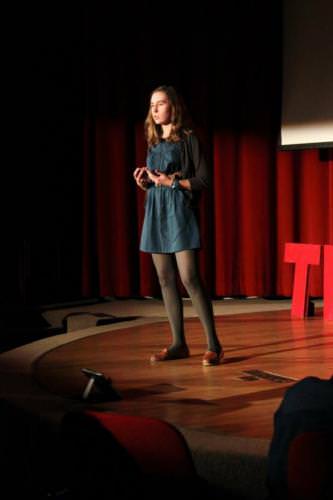
What would you do to promote recycling? Make a poster? Wear a green t-shirt? Maddy Yozwiak ’14 dressed up as Captain Planet during her senior year of high school. “I had lost all sense of shame,” Yozwiak said at a recent TedxYale conference, remembering how futile her efforts to promote sustainability seemed at the time. “No matter how we talked about climate change, no matter what we did, [my school’s Environmental Awareness Club] never had more than five people at our meetings… No one cared. I didn’t know what else to do besides don some gold tights, make a cape out of one of my mom’s towels, and try to get the word out one last time.
“Later that day,” Yozwiak says, “I’m sitting in Physics class, and I watch a girl go up to the front of the class, Poland Spring bottle in hand, and throw it in the trash. And right next to it—right next to it—was an orange bin that said ‘Please recycle bottles here.’ And I’m watching this whole scene unfold, and I just lose it. I run up to the front of the class in my costume, my cape flowing behind me, and I get up there and grab the bottle out, and I throw it in the recycling bin, and I turn around, and I say, ‘How could you not recycle this? The bin is right here—it’s right here! You should be ashamed of yourself!’ And I don’t know what they teach in formal activism training, but I’m pretty sure shaking trash and screaming at people are not high on the list… Later that day, I was driving home and got stuck in traffic, and I looked at the rows and rows of cars stretching out in front of me… And all I could think was, things are never going to change. At that moment, I gave up.”
Yozwiak, now a Physics major, planned to put environmental activism behind her when she came to Yale. But she ended up joining the Yale Student Environmental Coalition, founding Project Bright, an organization that installs solar panels on campus buildings, and giving a talk on her work at TEDxYale’s “City 2.0” conference on October 13th. TedxYale, a campus organization that hosts local versions of the TED Conference, invited professionals from the fields of architecture, agriculture, and digital data to share insights on how to improve the cities we live in. Yozwiak was the only student in the lineup of speakers. Her talk examined the issue from the angle of sustainability.
Yozwiak, who recently won the Office of Sustainability’s Sustainability Achievement Award for her work with Project Bright, talked about the fear that faces those working to make the world more sustainable, the fear that all their hard work may not even make an impact. She told the crowd gathered at “City 2.0” that the moment that lifted her from dejection to activism was the moment she heard about the United Nations Millenium Development Villages. This program aims to target regions most at risk of not reaching the UN Millenium Development Goals by the slated deadline of the year 2015 and find solutions for fighting poverty in those areas. Yozwiak scoffed at the program when she first heard about it, wondering how an organization of the United Nations’ scale “[could be] excited about one little village.” The more she learned about the program, however, the more inspired Yozwiak became. She realized that if the program could develop one successful model in one village, that model could be replicated and modified to work in countless other villages. Yozwiak decided to apply that philosophy to her own work.
In her work with Project Bright, Yozwiak strives to remember that if she and her team can develop a model for installing solar panels at one university, that model could work at universities across the country. Beyond making energy use at Yale more sustainable, Yozwiak hopes to replace the fear that Project Bright members may feel with a new way of thinking: “that every small action we take […] is never done in isolation.” Yozwiak also serves as treasurer of Engineers without Borders, which devises solutions for developing communities regarding issues such as water and sanitation systems. Last summer, she traveled to Cameroon with Engineers without Borders to construct clean water filtration systems in a rural village. Additionally, she helped develop an energy curriculum soon to be adopted by Yale’s Climate & Energy Institute. Yozwiak’s resilient enthusiasm is already taking her from making Yale greener to solving environmental problems on a larger scale.